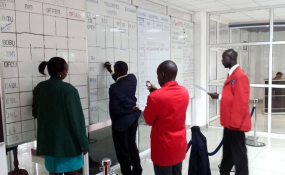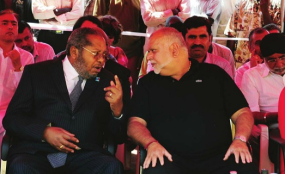By Mark Keith Muhumuza
Kampala — The interconnectedness of the Uganda Securities Exchange (USE) to the Nairobi Securities Exchange (NSE) has a lot to do with the dismal market performance in 2016.
The market had started the year with a capitalisation of Shs24.5 trillion but by Wednesday December 28, with only two days left to trading, it had fallen to Shs20.3 trillion.
The USE has eight cross-listed firms from the NSE, especially on account of commercial banks in Kenya losing value in their shareholding. Kenya Airways, Jubilee Holdings, Centum Investments, KCB Group, Equity Group, UCHUMI, Nation Media Group and East African Breweries are the eight cross-listed companies.
Cross-listing refers to where company shares are floated on a different stock exchange – in this case, a foreign country – after being listed on the primary stock exchange.
In this case, the eight Kenyan companies are listed on the primary market (NSE) but cross-listed on the secondary market (USE).
These companies do have subsidiaries that do business in Uganda.
Capping interest rates
On August 24, 2016 president Uhuru Kenyatta signed into law a law that allows Kenya to cap interest rates.
The following day, listed Kenyan banks saw the value of their shares tumbled sending the stock markets in Kenya and Uganda down into negative territory.
The cross-listed banks from the NSE, KCB and Equity Bank, saw the value of the shares drop by 20 per cent in just two days.
Because of the market movements on the two counters, the market capitalisation of the USE dropped from Shs22.5 trillion on August 23 and to Shs19.9 trillion by end of September 2. That is about Shs2.6 trillion wiped off in a space of two weeks.
Those banking stocks had not recovered since December 28. Year-on-Year, the Financial Times market data for listed stock indicates that KCB is down 28 per cent whereas Equity Group is down 27 per cent.
That means shareholders have seen the value of the shares they hold in the two companies drop significantly.
When a share price drops, it also impacts the All Share Index (ALSI), which shows the changing average value of the share prices of all companies on a stock exchange, and which is used as a measure of how well a market is performing. The USE’s ALSI was about 1,987 points at the start of 2016 but in the last month, it was an average of 1,486 points. That is a drop of almost 15 per cent. That means that overall; the value of the stock exchange was down 15 per cent in 2016.
Trend from 2015
However, the movements of Equity and KCB can only explain about Shs3 trillion wiped off the USE, leaving the other Shs1.4 trillion to other changes in the market but mostly still on the cross-listed firms. All the eight cross-listed firms have shed their share prices since 2015 and this trend continued into 2016.
According to Business Daily, the bear market trend on the NSE has been due to a combination of several factors.
“Besides the regular boom and bust cycles, the NSE’s bear run has been escalated by recent corporate scandals and the capping of interest rates that erased tens of billions of shillings from banking stocks since August alone,” Business Daily reported on December 16. It notes that at least four Kenyan billionaires had been wiped off billionaire list because of the declining performance of the NSE.
For Uganda, NSSF members are expected to feel the full impact of these movements when the half year report for 2016/17 is released. NSSF has investments in Equity and KCB where the value of shares dropped significantly.
It should be noted that cross-listed stocks hardly traded during the year but their impact was fully felt.
Quiet domestic scene
The USE is finally fully automated but that only helps avoid seeing the rather gloomy faces of traders in their red jackets. The automation means traders do not have to be at USE daily to have their trades written down on a white board. This ended in September 2015 when the market abandoned the white boards and open outcry by licensed brokers.
However, last year has been rather uninspiring for the locally listed Vision Group, Uganda Clays, Stanbic Bank, dfcu, Bank of Baroda Uganda, Umeme, NIC Holdings and British American Tobacco Uganda.
According to Mr Paul Bwiso, the CEO of the USE, the performance of the market is related to what was happening in the rest of the economy. “Investors are always looking out for where to make better returns. The emerging markets and the frontier markets like Uganda have seen investors retreat back to the United States after the Fed decision to raise interest rates in 2015,” he explained when the Umeme trading suspension was lifted in November 2016.




